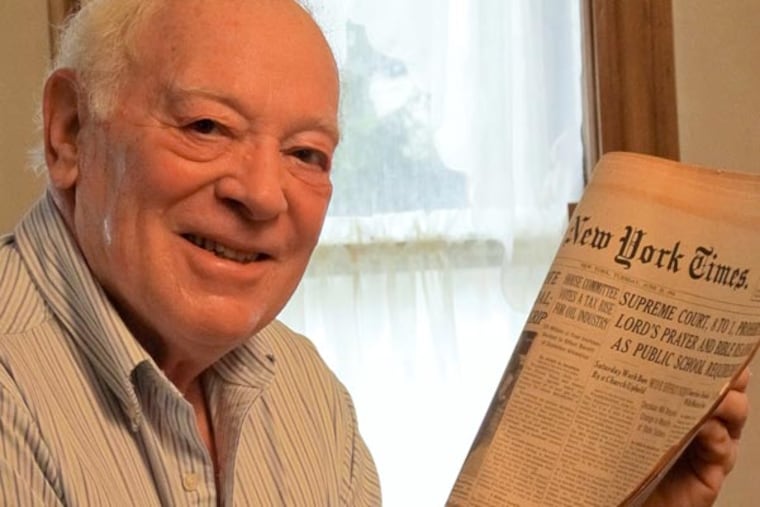Student's simple stand made history
He was a 16-year-old junior at Abington Senior High School, just making a statement, utterly unaware that he was about to make legal history.

He was a 16-year-old junior at Abington Senior High School, just making a statement, utterly unaware that he was about to make legal history.
It was in 1956 that Ellery Schempp staged the classroom protest that yielded Abington v. Schempp, the landmark 1963 U.S. Supreme Court decision banning mandatory Bible readings in public schools.
When Schempp's homeroom teacher read aloud 10 verses from the New Testament at the start of the day, as required by Pennsylvania law, Schempp brazenly paged through a Quran he had borrowed from a friend.
When a student read the Lord's Prayer over the public address system, another daily requirement, Schempp refused to stand.
Those actions earned him trips to the principal and guidance counselor, and triggered years of litigation over his belief that such readings were unconstitutional.
At the time, Pennsylvania was among three dozen states that required such readings in public schools.
"When I started this protest, I had no idea it would lead to court, let alone the Supreme Court," Schempp, 72, a retired physicist now living near Boston, said in a recent interview on the court's decision, handed down on June 17, 1963. He looked back at what his dissent achieved and the price his family paid.
"I thought it was pretty clear that the morning devotions were a religious practice" and therefore prohibited by the establishment clause of the First Amendment, which says government should not give preference to any particular religion, Schempp said. "I thought if I simply pointed that out, the grown-ups, they would fix it."
Instead, he incurred the wrath of school administrators. When they failed to act, Schempp, whose family practiced as Unitarian Universalists, sought legal representation by the American Civil Liberties Union of Pennsylvania.
Along with his letter seeking the group's help, he enclosed a $10 donation.
"Ten dollars at that time was probably $100 in today's money," Schempp said. (Actually, it would be $85.85.) "If a kid could save that from his grass-cutting and chores, then he really must be serious. It definitely played a role in getting their attention."
The prominent civil-rights attorney Henry Sawyer, of the Drinker Biddle law firm, took the case and stayed with it for years. Like many key figures in the matter, including Abington school principal Eugene Stull, he has died.
Schempp, an honors student, was accepted at every college to which he applied. He chose Tufts University in Medford, Mass.
But Stull was furious about the lawsuit, Schempp said, and tried to sabotage his applications with letters of "dis-recommendation."
Years later, Schempp said, he learned from the dean of admissions at Tufts that Stull also called to express his disapproval.
"In 1958 [a long-distance call] was a very big deal. He said Tufts had made a terrible decision and that I was the rotten apple in the barrel," Schempp said.
Schempp's dissent produced an avalanche of mail - about 5,000 letters to the family's house on Susquehanna Road in Roslyn. One-third were supportive, one-third politely argumentative, and one-third vile, including some smeared with excrement.
"After I graduated from high school and went on to college, the case was moot in terms of me," he said, so his siblings, Roger, 18 months younger, and Donna, five years younger, were added to the suit as plaintiffs.
Schempp said Roger was occasionally bullied in school and Donna was ostracized.
"Donna was particularly affected," Schempp said. "She was 12 or 13, a critical age, and wanted to just belong. Didn't want to be singled out. Some of her parents' friends told them not to play with Donna. Roger got shoved around a fair bit."
Roger Schempp, a retired administrator with the nonprofit OIC of America, lives in Pennsauken.
"I got a lot of the same treatment my sister got," he said in an interview. "But I quickly recognized that most of what I was getting was from the parents, passed through the kids.
"The school-bus pickup was near our house. When it passed the house, the kids shouted, 'Commie Camp,' everything under the sun. So I started walking to school."
When the Supreme Court finally ruled in 1963, Schempp's case was paired with another lawsuit brought by Madalyn Murray O'Hair, the founder of American Atheists, who objected to similar Bible readings in Maryland schools.
Even if his is not a household name, Ellery Schempp is proud of his legacy. And he chuckles at the fact that, many years later, he was admitted to the Abington alumni hall of fame, not for his stand as a protester but for his contributions to science as a physicist.
Of his choice to use the Quran in his dissent, he said, "It could have been the Bhagavad Gita. I didn't know a damn thing about Islam at the time, nor did anyone I knew.
"My point was that the Holy Bible was not the only book of importance," he said. "There were other scriptures of equal importance."